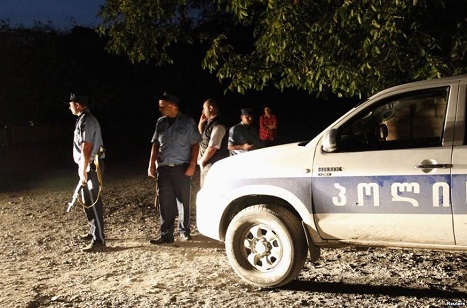Ombudsman report reveals “discrepancies” in a 2012 special armed operation in Lapankuri

Georgia’s Public Defender Ucha Nanuashvili believes there is a high possibility law enforcement officials used "improper and disproportionate use of force” during a special operation in eastern Georgia where five citizens disappeared.
The Public Council – a special group established within the Ombudsman’s office to investigate the Lapankuri operation – presented its report today that outlined the sequence of events of a special operation conducted in the Lopota Gorge, near Lapankuri village on August 28 and 29, 2012.
After reviewing the report, Georgia’s Public Defender believed law enforcement officers used improper and disproportionate use of force during the operation but could not confirm this and said it was up to investigative bodies to determine this.
On August 26, 2012, five Lapankuri village residents disappeared. This was followed by an announcement on August 28 by former government officials that an armed, subversive group was illegally trying to enter Georgia from the North Caucasus. This was later found to be false.
At the time a crisis management group was created led by the then Prime Minister Ivane (Vano) Merabishvili. On August 29, the Ministry of Internal Affairs released a statement that claimed a special operation had resulted in the death of two Ministry employees and one Defence Ministry doctor. The statement also claimed 11 members of the subversive group were also killed.
However, the Public Defender 100-page report contradicted this claim and revealed there was no armed, subversive group trying to enter Georgia and seven people had been killed, not 11.
"[We] recommend the official forces find out why there was a discrepancy between the initial information of the number of deceased members of the illegal armed group (11 persons) from the current data (7 persons),” stated the report.
The report, which was carried out over a 12-month period, revealed several other discrepancies in the initial reporting of the case and called on investigative bodies to address these issues.
At the time, representatives of Georgian state authorities declared members of the illegal armed group had arrived in Georgia from the Northern Caucasus, however this could not be confirmed, the Public Council report stated.
"It is not known when and how the members of the illegal armed group entered Georgia and how the survivors from the group left the territory of Georgia, if at all. Despite official information [stating] all the deceased members of the group (except Bahaudin Kavtarashvili) had already left Georgian territory by August 28, 2012, information acquired by the Public Council confirms the opposite.”
"Accordingly, it is important to determine the ultimate purpose of actions of the representatives of the Georgian authorities who for days issued incorrect information to the public,” read the report.
Earlier information revealed by the Public Defender noted that the people killed in the special operation were part of a Chechen group who, previously lived in different parts of Europe but arrived in Georgia following a request of senior Georgian Interior Ministry officials on February 2012.
Georgian military authorities promised Chechen militants a so-called corridor to Chechnya, as well as military training, equipment and facilitation of their return to their homeland. These foreigners were accommodated and trained by Georgian officials however, after the government did not organise the promised "corridor” to them, the Chechen militants lost trust in the Georgian government.
The Chechensbelieved they were unlawfully being kept in Georgia as the 2012 elections were approaching and the Government possibly wanted to use them in the electoral process in some form, possibly to boost riot numbers. The group demanded Georgia fulfil its promise of ensuring their safe return through a "corridor” but this was refused by the Georgian Interior Ministry, who then demanded the militants to surrender their weapons. The Chechen militants refused so the Georgian troops launched a so-called anti-terrorist operation.
Immediately after the operation, the Georgian Government did not state Georgian citizens were among those who were killed in the operation. A short time later it was revealed the Government was aware of the identities of the majority of members of the group, and that some of them were Georgian citizens not foreigners.
Looking ahead, the Public Council report noted several steps needed to be taken to ensure effective, impartial and independent investigation of the Lapankuri special operation, as there were "numerous discrepancies” in the initial investigation conducted by the Ministry of Internal Affairs.
These steps are:
- Starting an investigation on the legality and proportionality of the use of lethal force by law enforcers;
- Investigating circumstances pertaining to the planning and execution of the special operation;
- Ensuring the investigation (including investigative actions essential for the case) are to be conducted by the Chief Prosecutor’s Office of Georgia; and
- Family members of the deceased must be granted with the status of a victim’s successor and their effective participation in the investigation must be ensured.
- Nanuashvili noted the Public Council had addressed Parliament to request the Chief Prosecutor’s Office launch a new investigation.
"The Public Council believes it is important for Parliament to request the following information from the Chief Prosecutor’s Office of Georgia and provide the following information: On what grounds does the counter-intelligence service of the MIA carry out the investigation; at what stage is the investigation currently in and why is it difficult to come to a final decision.”
It also asked: "Why are the family members of the deceased not granted with a victim’s successor status and why don’t they receive information about the investigation. At the same time the family members of the deceased do not have information about the results of the forensic examination after the exhumation of the bodies.”
 Tweet
Tweet  Share
Share